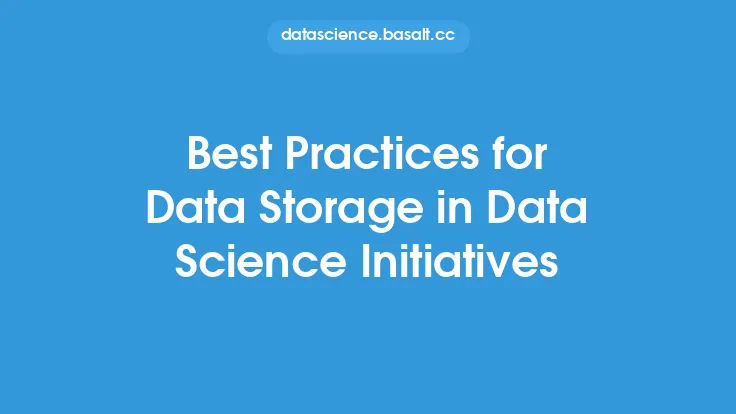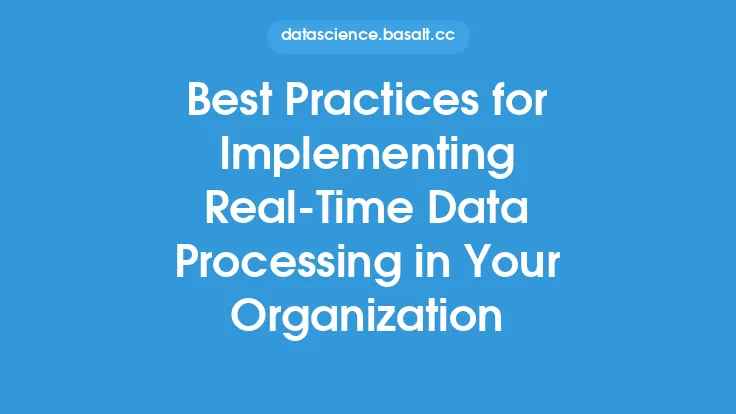As a data engineer, one of the most critical aspects of your job is to ensure that data is stored efficiently, securely, and in a way that allows for easy access and retrieval. This requires a deep understanding of data storage best practices, which can help you to design and implement data storage systems that meet the needs of your organization. In this article, we will explore the key principles and techniques that underpin effective data storage, and provide guidance on how to apply them in real-world scenarios.
Understanding Data Storage Fundamentals
Before we dive into the best practices for data storage, it's essential to understand the fundamental concepts that underpin data storage systems. This includes understanding the different types of data storage devices, such as hard disk drives (HDDs), solid-state drives (SSDs), and flash storage, as well as the various data storage protocols, such as block storage, file storage, and object storage. Additionally, it's crucial to understand the concepts of data redundancy, data replication, and data backup, which are critical for ensuring data availability and durability.
Data Storage Design Principles
When designing a data storage system, there are several key principles to keep in mind. First and foremost, the system should be scalable, allowing it to grow and adapt to changing data storage needs. This can be achieved through the use of distributed storage systems, which allow data to be split across multiple nodes or devices. Another critical principle is data locality, which refers to the idea of storing data in close proximity to the applications and users that need to access it. This can help to reduce latency and improve performance. Finally, the system should be designed with data security and compliance in mind, incorporating features such as encryption, access controls, and auditing.
Data Storage Technologies
There are many different data storage technologies available, each with its own strengths and weaknesses. Some of the most common include relational databases, NoSQL databases, data warehouses, and data lakes. Relational databases, such as MySQL and Oracle, are well-suited for storing structured data and supporting complex transactions. NoSQL databases, such as MongoDB and Cassandra, are ideal for storing unstructured or semi-structured data and supporting high-performance applications. Data warehouses, such as Amazon Redshift and Google BigQuery, are designed for analytics and business intelligence workloads, while data lakes, such as Hadoop and Spark, are optimized for storing and processing large amounts of raw, unprocessed data.
Data Storage Management
Effective data storage management is critical for ensuring that data is stored efficiently, securely, and in a way that allows for easy access and retrieval. This includes tasks such as data backup and recovery, data archiving, and data retention. It's also essential to have a robust data governance framework in place, which includes policies and procedures for data quality, data security, and data compliance. Additionally, data storage management involves monitoring and optimizing data storage systems, including tasks such as performance tuning, capacity planning, and troubleshooting.
Data Storage Security
Data storage security is a critical aspect of data storage best practices, as it helps to protect data from unauthorized access, theft, or damage. This includes implementing robust access controls, such as authentication, authorization, and encryption, as well as ensuring that data is stored in a secure and compliant manner. It's also essential to have a disaster recovery plan in place, which includes procedures for restoring data in the event of a disaster or outage. Finally, data storage security involves regularly monitoring and auditing data storage systems, including tasks such as vulnerability scanning, penetration testing, and compliance auditing.
Data Storage Optimization
Data storage optimization is the process of ensuring that data storage systems are running efficiently and effectively. This includes tasks such as performance tuning, capacity planning, and data compression. It's also essential to optimize data storage systems for specific workloads, such as analytics or transactional processing. Additionally, data storage optimization involves monitoring and analyzing data storage systems, including tasks such as monitoring storage usage, tracking performance metrics, and analyzing data access patterns.
Data Storage Scalability
Data storage scalability refers to the ability of a data storage system to grow and adapt to changing data storage needs. This can be achieved through the use of distributed storage systems, which allow data to be split across multiple nodes or devices. It's also essential to design data storage systems with scalability in mind, incorporating features such as horizontal scaling, vertical scaling, and load balancing. Additionally, data storage scalability involves monitoring and optimizing data storage systems, including tasks such as monitoring storage usage, tracking performance metrics, and analyzing data access patterns.
Conclusion
In conclusion, data storage best practices are critical for ensuring that data is stored efficiently, securely, and in a way that allows for easy access and retrieval. By understanding the fundamental concepts of data storage, designing data storage systems with key principles in mind, and using the right data storage technologies, data engineers can create robust and scalable data storage systems that meet the needs of their organization. Additionally, by implementing effective data storage management, security, optimization, and scalability strategies, data engineers can ensure that data storage systems are running efficiently and effectively, and that data is protected from unauthorized access, theft, or damage.





